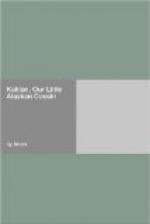Men were standing about talking and laughing, others working hard. All manner of men were there scattered over the tundra,[14] and Ted became interested in two who were working together in silence.
[Footnote 14: The name given to the boggy soil of the beach.]
[Illustration: “’LET’S WATCH THOSE TWO MEN. THEY HAVE EVIDENTLY STAKED A CLAIM TOGETHER.’”]
“What are they doing?” he asked his father. “I can’t see how they expect to get anything worth having out of this mess.”
“Beach-mining is quite different from any other,” said his father. “Let’s watch those two men. They have evidently staked a claim together, which means that nobody but these two can work on the ground they have staked out, and that they must share all the gold they find. They came here to prospect, and evidently found a block of ground which suited them. They then dug a prospect hole down two to five feet until they struck ‘bedrock,’ which happens to be clay around here. They passed through several layers of sand and gravel before reaching this, and these were carefully examined to see how much gold they contained. Upon reaching a layer which seemed to be a good one, the gravel on top was stripped off and thrown aside and the ‘pay streak’ worked with the rocker.”
“What is that?” asked Ted, who was all ears, while Kalitan was taking in everything with his sharp black eyes.
“That arrangement that looks like a square pan on a saw-buck is the rocker. The rockers usually have copper bottoms, and there is a great demand for sheet copper at Nome, but often there is not enough of it, and the miners have been known to cover them with silver coins. That man you are watching has silver dollars in his, about fifty, I should say. It seems extravagant, doesn’t it, but he’ll take out many times that amount if he has good luck.”
The man, who had glanced up at them, smiled at that and said:
“And, if I don’t have luck, I’m broke, anyhow, so fifty or sixty plunks won’t make much difference. You going to be a miner, youngster?”
“Not this trip,” said Ted, with a smile. “Say, I’d like to know how you get the gold out with that.”
“At first we used to put a blanket in the rocker, and wash the pay dirt on that. Our prospect hole has water in it, and we can use it over and over. Some of the holes are dry, and there the men have to pack their pay dirt down to the shore and use surf water for washing. Most of our gold is so fine that the blanket didn’t stop it, so now we use ‘quick.’ I reckon you’d call it mercury, but we call it quick. You see, it saves time, and work-time up here is so short, on account of winter setting in so early, that we have to save up our spare minutes and not waste ’em on long words.”
Ted grinned cheerfully and asked: “What do you do with the quick?”
“We paint it over the bottom of the rocker, and it acts like a charm and catches every speck of gold that comes its way as the dirt is washed over it. The quick and the gold make a sort of amalgam.”




